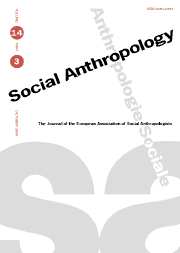Article contents
La ‘communauté’ des modernes. Etude comparative d’une idée-valeur polysémique en Russie et en Occident
Published online by Cambridge University Press: 02 January 2001
Abstract
Originally designed by an emerging sociology upon the model of the social corps as defined by Ancien Régime society, the notion of community retains an anti-individualist flavour delivered in terms of a global ideological value. Yet, the nineteenth-century Russian slavophile movement provides an appropriate example to demonstrate how, through the construction of ‘collective actors’ endowed with consciousness and proper will, the ‘community’ as a principle constituted for holistic societies a powerful factor of modern acculturation.
The contemporary ‘communautarism’ is one of its distant avatars which, far from being opposed to individualism, intensifies it by reducing all collective forms of belonging to subjective claims and choices.
- Type
- Research Article
- Information
- Copyright
- © 2000 European Association of Social Anthropologists
- 2
- Cited by


